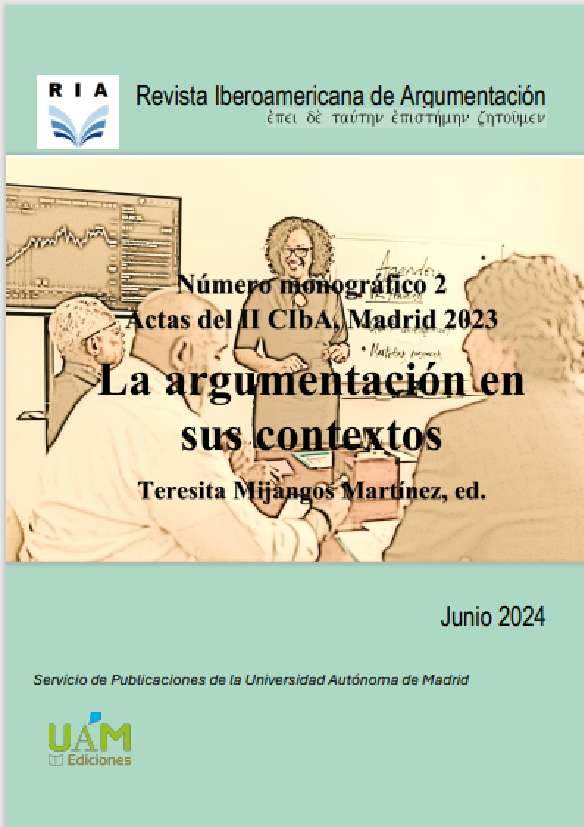Keywords:
argument, Aristotle, enthymeme, epicheírema, Minucian, rhetoric, syllogismCopyright (c) 2024 Revista Iberoamericana de Argumentación

This work is licensed under a Creative Commons Attribution-NonCommercial-NoDerivatives 4.0 International License.
Abstract
In the Aristotelian corpus the term epicheírema is used in the technical sense of “argument”, except in Topics 162a15-18, where it is specifically interpreted as a dialectical syllogism. In Rhetoric, Aristotle does not use the term epicheírema, but he does mention a rhetorical syllogism named enthymeme and which, like the dialectical syllogism, derives from probable premises. The similarity between the dialectical system and the rhetorical system leads to the entry of the term epicheírema into rhetoric and also to the conflict with respect to the enthymeme. From this point onwards, the rhetoricians mould the semantic scope of the term epicheírema according to how it fits into their rhetorical system.
Downloads
References
Bitzer, L.F. (1974). “Aristotle’s Enthymeme Revisited”. En: K.V. Erickson (Ed.), Aristotle: The Classical Heritage of Rhetoric (pp. 141-155), Metuchen, N.J.: The Scarecrow Press.
Braet, A.C. (2004). “Hermagoras and the Epicheireme”. Rhetorica 22/4, 327-347.
Burnyeat, M.F. (1996). “Enthymeme: Aristotle on the Rationality of Rhetoric”. En: A.O. Rorty (Ed.), Essays on Aristotle’s Rhetoric (pp. 88-115), California ? London: University of California Press.
Candel Sanmartín, M. (1982). Aristóteles. Tratados de Lógica (Órganon) I. Categorías – Tópicos – Sobre las refutaciones sofísticas. Madrid: Gredos.
Caplan, H. (1964). [Cicero]. Rhetorica ad Herennium. Cambridge, MA: Harvard University Press.
Chiron, P. (2007). “Les Arts Rhétoriques gréco-latins: structures et fonctions”. Metis 5, 101-134.
Church, D.A. y Cathcart, R.S. (1965). “Some Concepts of the Epicheireme in Greek and Roman Rhetoric”. Western Speech 29, 140-147.
Dufour, M. (1960). Aristote. Rhétorique. 3 Vols. Paris: Les Belles Lettres.
Feezel, J.D. (1967). “The Mystery of the Epicheireme”. Western Speech 31, 109-115.
Fortenbaugh, W.W. (1998). “Cicero, On Invention 1.51-77: Hypothetical Syllogistic and the Early Peripatetics”. Rhetorica 16/1, 25-46.
Grimaldi, W.M.A. (1972). Studies in the Philosophy of Aristotle’s Rhetoric. Wiesbaden: F. Steiner.
Hubbell, H.M. (1949). Cicero. De inventione. De optimo genere oratorum. Topica. Cambridge, MA: Harvard University Press.
Jebb, R.C. (1876). The Attic Orators from Antiphon to Isaeus. 2 Vols. London: MacMillan and Co.
Keil, B. (1907). “Zwei Identifikationen”. Hermes 42/4, 548-563.
Kennedy, G.A. (1994). A New History of Classical Rhetoric. New Jersey: Princeton University Press.
Klein, J. (1994). “Epicheirem”. En: G. Ueding (Ed.), Historisches Wörterbuch der Rhetorik, Vol. 2 (cols. 1251-1258), Tübingen: Max Niemeyer Verlag.
Kraus, M. (1994). “Enthymem”. En: G. Ueding (Ed.), Historisches Wörterbuch der Rhetorik, Vol. 2 (cols. 1197-1222), Tübingen: Max Niemeyer Verlag.
Kroll, W. (1936). “Das Epicheírema”. Sitzungsberichte der Akademie der Wissenschaften in Wien 216/2, 1-17.
Liddell, H.G, Scott, R, Jones, H.S. y McKenzie, R. (1996). Greek-English Lexicon. 9a ed. Oxford: Clarendon Press.
Long, F. (2005). “From Epicheiremes to Exhortation: A Pauline Method for Moral Persuasion in 1 Thessalonians”. En: A. Eriksson y T. Olbricht (Eds.), Rhetoric, Ethic, and Moral Persuasion in Biblical Discourse (pp. 179-195), New York: T&T Clark.
Meador, P.A. Jr. (1964). “Minucian, On Epicheiremes: An Introduction and a Translation”. Speech Monographs 31/1, 54-63.
Meador, P.A. Jr. (1966). “The Classical Epicheireme: A Re-examination”. Western Speech 30, 151-155.
Martin, J. (1974). Antike Rhetorik. Technik und Methode. München: C.H. Beck.
Nadeau, R. (1959). “Classical Systems of Stases in Greek: Hermagoras to Hermogenes”. Greek, Roman, and Byzantine Studies 2, 51-71.
Núñez, S. (1997a). Retórica a Herenio. Madrid: Gredos.
Núñez, S. (1997b). Cicerón. La invención retórica. Madrid: Gredos.
Ortega Carmona, A. (1999). M. Fabii Quintiliani Institutionis Oratoriae Libri XII. Tomus II / Marco Fabio Quintialiano. Sobre la formación del orador. Doce libros. Tomo II. Salamanca: Publicaciones Universidad Pontificia.
Papadimitriou, E. (1979). Ethische und psychologische Grundlagen der Aristotelischen Rhetorik. Frankfurt ? Bern ? Las Vegas: Peter Lang.
Patillon, M. (1997). Hermogene. L’Art Rhétorique. Paris: L’Age d’Homme.
Patillon, M. (2008-2014). Corpus rhetoricum. 6 Vols. Paris: Les Belles Lettres.
Patillon, M. (2010). La théorie du discours chez Hermogène le rhéteur. Paris: Les Belles Lettres.
Plebe, A. (1959). “Retorica aristotelica e logica stoica”. Filosofia 10, 391-424.
Polychronopoulos, P. (1979). “The Epicheírema in Rhetorical Discourse”. Platon 31, 44-51.
Rabe, H. (1913). Hermogenis opera. Lipsiae: Teubner.
Rabe, H. y Kennedy, G.A. (2005). Invention and Method. Two Rhetorical Treatises from the Hermogenic Corpus. Atlanta: Society of Biblical Literature.
Racionero, Q. (1994). Aristóteles. Retórica. Madrid: Gredos (19901).
Rapp, C. (2023). “Logic in Ancient Rhetoric”. En: L. Castagnoli y P. Fait (Eds.), The Cambridge Companion to Ancient Logic (pp. 263-282), Cambridge: Cambridge University Press.
Ryan, E.E. (1984). Aristotle’s Theory of Rhetorical Argumentation. Montréal: Bellarmin.
Solmsen, F. (1941). “The Aristotelian Tradition in Ancient Rhetoric”. American Journal of Philology 62/2, 169-190.
Spengel, L. (1853). Rhetores Graeci. Vol. I. Leipzig: Teubner.
Thiele, G. (1893). Hermagoras. Ein Beitrag zur Geschichte der Rhetorik. Strassburg: Karl J. Trübner.
Tredennick, H. y Forster, E.S. (1960). Aristotle. Posterior Analytics. Topica. Cambridge, MA: Harvard University Press.
Volkmann, R. (1872). Die Rhetorik der Griechen und Römer in systematischer Übersicht. Berlin: H. Ebeling & C. Plahn.
